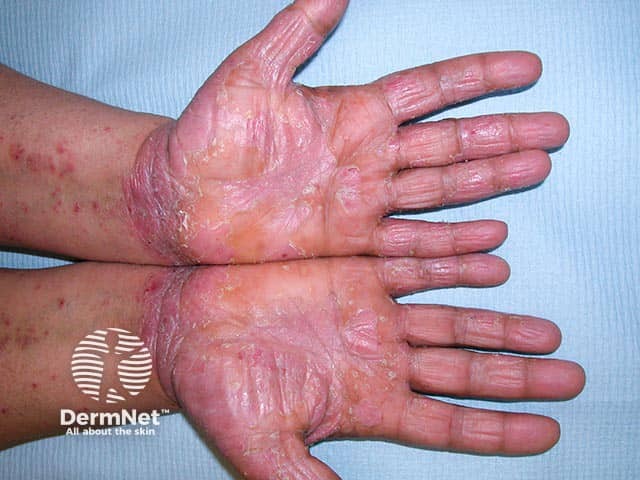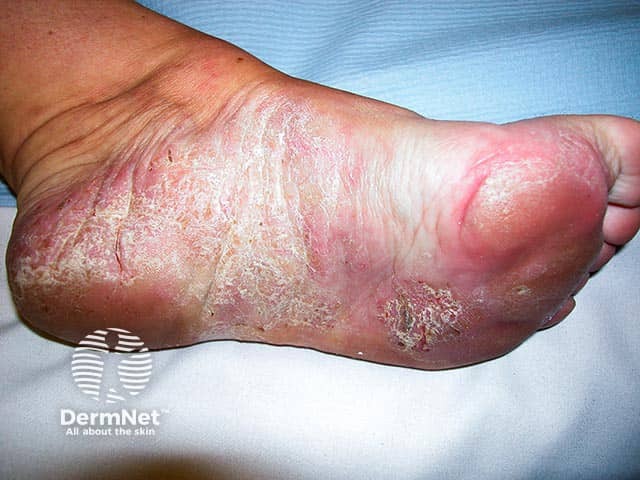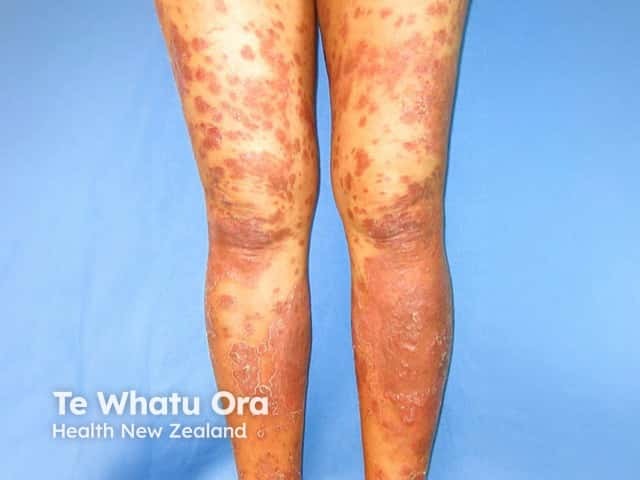Main menu
Common skin conditions

NEWS
Join DermNet PRO
Read more
Quick links
Paradoxical psoriasis — extra information
Paradoxical psoriasis
Last reviewed: April 2023
Authors: Dr Sabrina Sapsford, Research Fellow, University of Auckland; Dr Nicholas Turnbull, Dermatologist, Auckland, New Zealand (2023)
Reviewing dermatologist: Dr Ian Coulson
Edited by the DermNet content department
Introduction Demographics Causes Clinical features Variation in skin types Complications Diagnosis Differential diagnoses Treatment Prevention Outcome
What is paradoxical psoriasis?
Paradoxical psoriasis is a drug side effect that results in the formation of red, scaly, psoriasiform plaques on the skin due to treatment with tumour necrosis factor alpha (TNFα) inhibitors.
TNFα inhibitors are used to treat autoimmune conditions such as inflammatory bowel disease, rheumatoid arthritis, and psoriasis. They can improve quality of life, reduce hospitalisations, and in some cases achieve remission. However, they have been associated with psoriasiform-like reactions and new-onset psoriasis, with the first case report in 2004.

Bilateral psoriatic eruption that arose during adalimumab treatment for inflammatory bowel disease

Psoriasiform eruption that arose 7 months after initiation of adalimumab for inflammatory bowel disease

Pustular paradoxical psoriasis arising during TNF inhibitor treatment
Who gets paradoxical psoriasis?
Studies show that 2–5% of patients who receive TNFα inhibitors may develop paradoxical psoriasis. The incidence rate is higher in women, and in smokers and ex-smokers, although the absolute risk remains low.
Patients affected by paradoxical psoriasis tend to be in their fourth or fifth decade.
What causes paradoxical psoriasis?
The aetiology of paradoxical psoriasis is not fully understood. Classical psoriasis is an autoimmune, T-cell-mediated disease. In contrast, paradoxical psoriasis may be caused by an exaggerated interferon response without T-cell induction.
- Personal or family history of psoriasis or atopy (~60%)
- Possible common susceptibility genes involved in inflammatory bowel disease and paradoxical psoriasis.
- The older TNF inhibitor infliximab is more likely to cause paradoxical psoriasis than adalimumab or etanercept.
- Development of paradoxical psoriasis following anti-TNFs initiation is on average 11 months (longer than most adverse reactions), indicating that other environmental triggers are involved.
- Women appear to be more frequently affected.
There does not appear to be a dose-response relationship between anti-TNF agent use and the risk of paradoxical psoriasis.
What are the clinical features of paradoxical psoriasis?
- Small or large plaques or pustules affecting their scalp, extremities (including arms and legs), palms of the hands, or soles of the feet.
- Younger patients may present differently with scalp involvement or an inverse distribution affecting the axillae, under breast area, groin, or intergluteal cleft.
- Scalp psoriasis may cause alopecia.
Most patients with paradoxical psoriasis develop plaque psoriasis. However, some patients develop pustular or palmoplantar psoriasis, and TNFα inhibitor exposure is a risk factor for these types of psoriasis.
How do clinical features vary in differing types of skin?
Plaques may be erythematous or violaceous in colour depending on the Fitzpatrick skin type. The distribution of psoriasis may also differ in darker skin; further studies are needed.
What are the complications of paradoxical psoriasis?
- Secondary skin infection
- Insomnia
- Aesthetic concerns
- Psychological effects of psoriasis
How is paradoxical psoriasis diagnosed?
Psoriasis is a clinical diagnosis, and the temporal association with anti-TNF treatment may help diagnose paradoxical psoriasis.
A skin biopsy may help distinguish paradoxical psoriasis from other skin problems.
What is the differential diagnosis for paradoxical psoriasis?
- New onset psoriasis eg, plaque psoriasis, guttate psoriasis
- Seborrhoeic dermatitis
- Pityriasis rosea
- Lichen planopilaris
- Subacute cutaneous lupus erythematosus
- Fungal skin infections (eg, tinea corporis)
What is the treatment for paradoxical psoriasis?
Because classical psoriasis is generally associated with alcohol excess, depression, sleep disturbance, and metabolic syndrome, these conditions should be well-managed in patients being treated for paradoxical psoriasis.
General measures
- Weight loss if overweight or obese
- Smoking cessation
- Good sleep hygiene
Specific measures
- Topical steroids
- Calcipotriene (calcipotriol)
- Topical calcineurin inhibitors
- Oral ciclosporin
- Methotrexate
- UVB phototherapy
- Change from TNF inhibitor to alternative biologic therapy
How do you prevent paradoxical psoriasis?
There is no known preventative strategy for paradoxical psoriasis.
What is the outcome for paradoxical psoriasis?
The approach to treatment for patients who need TNF inhibitors should remain the same. The absolute risk of paradoxical psoriasis is low. In most patients, if skin lesions develop, these can be controlled with topical steroids.
Bibliography
- Bucalo A, Rega F, Zangrilli A, et al. Paradoxical Psoriasis Induced by Anti-TNFα Treatment: Evaluation of Disease-Specific Clinical and Genetic Markers. Int J Mol Sci. 2020;21(21). doi: 10.3390/ijms21217873. Journal
- Conrad C, Di Domizio J, Mylonas A, et al. TNF blockade induces a dysregulated type I interferon response without autoimmunity in paradoxical psoriasis. Nat Commun. 2018;9(1):25. doi: 10.1038/s41467-017-02466-4. Journal
- Dereure O, Guillot B, Jorgensen C, et al. Psoriatic lesions induced by antitumour necrosis factor-alpha treatment: two cases. Br J Dermatol. 2004;151(2):506–7. doi: 10.1111/j.1365-2133.2004.06107.x. Journal
- Guerra I, Pérez-Jeldres T, Iborra M, et al. Incidence, Clinical Characteristics, and Management of Psoriasis Induced by Anti-TNF Therapy in Patients with Inflammatory Bowel Disease: A Nationwide Cohort Study. Inflamm Bowel Dis. 2016;22(4):894–901. doi: 10.1097/MIB.0000000000000757. Journal
- Mazloom SE, Yan D, Hu JZ, et al. TNF-α inhibitor-induced psoriasis: A decade of experience at the Cleveland Clinic. J Am Acad Dermatol. 2020;83(6):1590–8. doi: 10.1016/j.jaad.2018.12.018. Journal
- Nestle FO, Kaplan DH, Barker J. Psoriasis. N Engl J Med. 2009;361(5):496–509. doi: 10.1056/NEJMra0804595. Journal
- Peer FC, Miller A, Pavli P, Subramaniam K. Paradoxical psoriasiform reactions of anti-tumour necrosis factor therapy in inflammatory bowel disease patients. Internal Medicine Journal. 2017;47(12):1445–8. doi: 10.1111/imj.13637. Journal
- Thein D, Egeberg A, Skov L, Loft N. Absolute and Relative Risk of New-Onset Psoriasis Associated With Tumor Necrosis Factor-α Inhibitor Treatment in Patients With Immune-Mediated Inflammatory Diseases: A Danish Nationwide Cohort Study. JAMA Dermatology. 2022;158(9):997–1004. doi: 10.1001/jamadermatol.2022.2360. Journal
On DermNet
- Paradoxical psoriasis images
- Tumour necrosis factor inhibitors
- Infliximab
- Adalimumab
- Etanercept
- Biological treatments
- Psoriasis
- Drug-induced psoriasis
